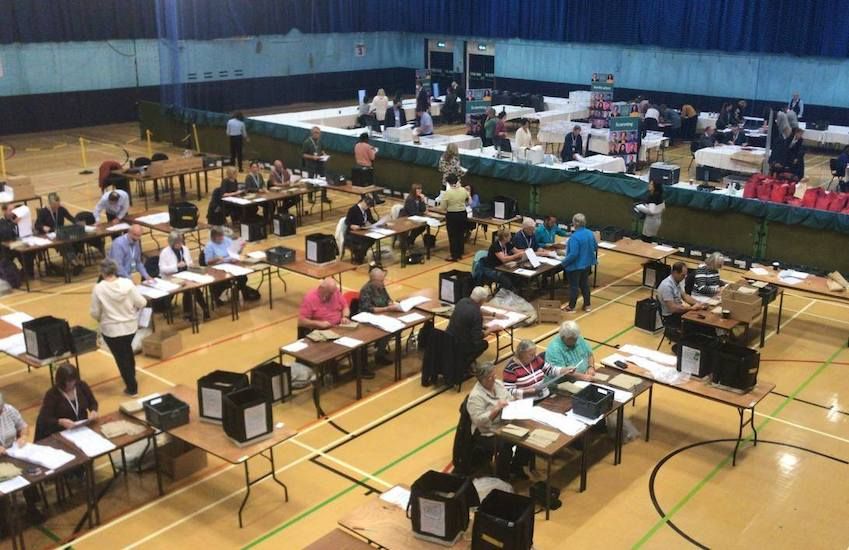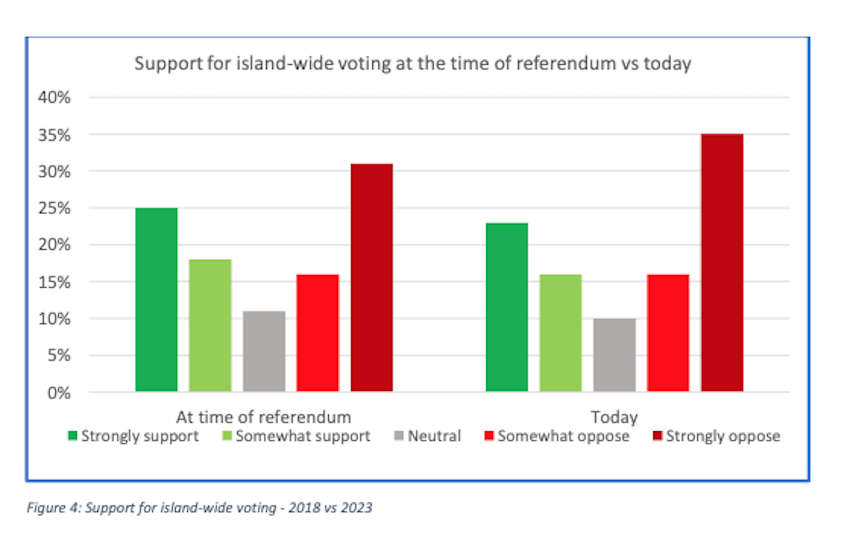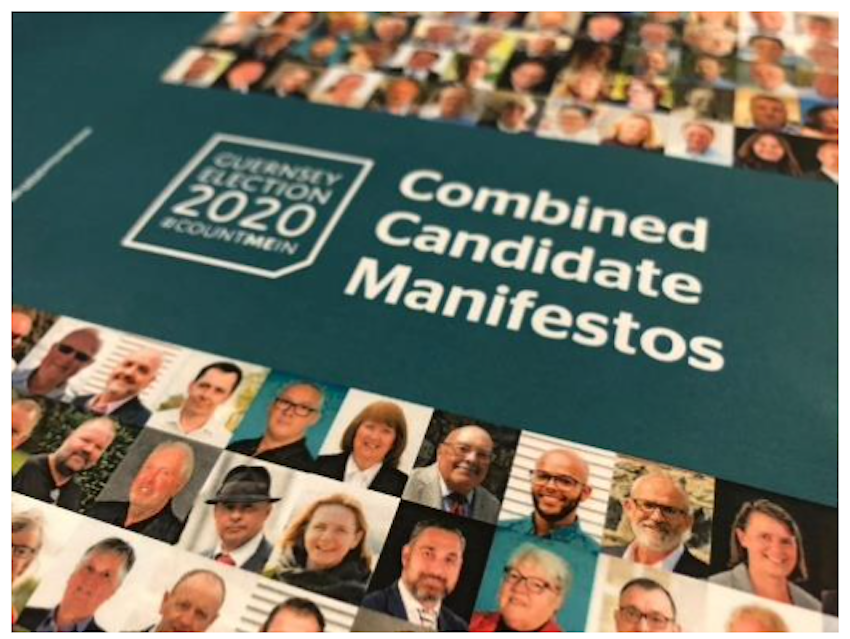


Cutting the number of votes, better training for candidates and more information for the electorate are all on the table to make island-wide voting work better.
The Scrutiny Management Committee’s review of the system introduced for the last general election was released this morning.
A survey it includes also shows how support for island-wide voting has fallen from 43% to 39% since the referendum that paved the way for the system in 2018.
While 55% think it has resulted in worse governing of the island than before.

Recommendations by SMC have now been passed on to the States Assembly and Constitution Committee to decide whether to take them forward or not.
They will not lead to any wholesale change before the next election in June 2025, but there could be tweaks made.
“For the 2025 election, based on the evidence considered, the Review Panel believes that some changes could be made that would constitute improvements to the current system,” said SMC President Deputy Yvonne Burford.
One of those is considering a reduction in the number of votes available to each voter.
Of those responding to the committee’s survey, 55% thought the number of votes should be reduced from 38.
Those who think there should be a reduction favoured it being 20 votes or fewer (83%).
“The ability to vote, and votes themselves, are widely considered important and valued,” the report states.
“Previous complaints about parish-based voting often included claims that there were insufficient suitable candidates in a voter’s district for them to happily use all their votes, and this feeling was also reflected in relation to island-wide voting in comments in the survey.
“It is understandable for a voter to feel that a vote not used is a vote wasted and that it represents a squandering of one’s franchise. People voted for candidates they had no strong feelings about or whom they knew little about, perhaps partly in preference to ‘wasting’ (i.e. not using) votes. It is impossible to know what effect on the outcome of the election a tendency to vote for more candidates than one might otherwise do, in order to avoid feeling disenfranchised.”
Five of their recommendations are based around improving information about the candidates.
A manifesto booklet that was produced by the States should be distributed earlier, it says, to allow more time to review it.

There should also be more consideration given to allowing candidates more space - up to four sides of A4, and more freedom about the layout.
While there should be more promotion and accessibility of candidate videos, perhaps including shorter and longer version for each candidate.
”70% of respondents said that the candidate manifesto booklet should be delivered earlier to allow people more time to make decisions about who to vote for, whilst 68% also wanted to see more information in the booklet about each candidate, despite the already significant size of the document.
“On the face of it, this is perhaps a surprising finding given the strong theme throughout the evidence that choosing from so many candidates is an impossible task.
“One explanation may be that whilst people find it relatively easy to rule in and rule out certain candidates with a high-level assessment, for the remaining candidates it may well be helpful to have more easily accessible information.”
The booklet was used by 87% of people while deciding on who to vote for.
“Given the lack of face-to-face contact between candidates and voters, the Review Panel believes that the States should promote candidate videos more heavily and consider different formats for accessing them (e.g. an app).
“Consideration could also be given to each candidate having a short version and a longer version of the video whereby a voter could opt to watch the more detailed version if the short one left them seeking more information. The evidence from the survey showed that only 28% of voters used the videos as a source of information, yet with the inability to meet candidates or watch their performance at hustings to any meaningful extent, videos take on an increased relevance for voters.”
Another recommendation is based around ensuring candidates understand the role, responsibilities and time commitments of being a deputy before they can register to stand.
83% of respondents supported there being an obligation to attend formal sessions on this.
“It is perhaps reasonable to assume that some prospective candidates may be deterred from standing once they understand more about the requirements of the role and of course it is to everybody’s benefit, including the potential candidate, if this is discovered sooner rather than later. Such sessions would also allow successful candidates to arrive in the Assembly much better prepared for the tasks and expectations that face them. Furthermore, the significant time that is taken up in the early days of a parliamentary term in induction sessions could be reduced if candidates had already undergone some similar sessions.”
And the other recommendations:
To consider, in consultation with the parish douzaines and other interested parties, all possible methods of improving links between elected representatives and parish douzaines and between elected representatives and parish or district residents, in time to implement such improvements for the 2025 election
To investigate whether an expanded signed declaration by candidates should be required and, if so, what it should encompass.
To note that any future consideration (post-2025) of a further referendum on the electoral system should include a more equitable system of explaining the options to voters.
How the review worked
The Review Panel gathered evidence by a call for evidence, a survey and public hearings.
It began with a call for evidence inviting the public to submit their views. A total of 67 responses were received. Six responses were from current deputies and six were submitted on behalf of parishes.
The survey was undertaken on behalf of the Review Panel by Island Global Research, with the aim of gathering people’s attitudes to a wide range of issues around island-wide voting. A total of 1,465 completed responses were received, which is said to be a statistically significant sample.
Residents of Guernsey, Herm and Jethou aged 16 and over were eligible to take part, whether or not they had voted in the referendum or in the 2020 election.
Respondents were asked questions about their age, sex, income, and which parish they are resident in, to assist in weighting responses in accordance with the latest population data from the States. The survey was completed by a wide range of people. Respondents’ parish, sex and income data was reasonably representative, but there was an under-representation of younger people, and a corresponding over-representation of those aged 50 to 79, and this was accounted for.
The Review Panel arranged two public hearings which were held in early October 2023, covering four broad themes related to island-wide voting. Each theme - the effects on the parishes, the composition and operation of the States, political parties and the mechanics of elections and electoral systems - had a different panel of witnesses
The issue of island-wide voting is far from a new one, Scrutiny’s report says.
Until 1900, no member of the States of Deliberation had been elected directly by the people. The first nine deputies to sit in the States were elected that year on an island-wide basis although, at that time, only certain cohorts of the population had the right to vote. Jurats, douzaine representatives and rectors, together with the Bailiff and Law Officers, made up the other members of the Assembly. Gradually, the franchise was extended and the number of directly elected members increased.
In 1920 the island was split into five electoral districts which between them elected 18 deputies, while non- elected members made up the remainder of the States.
In 1948 the ten parishes became the electoral districts and a total of 33 deputies were elected to serve alongside the non-elected members. Also that year, the office of Conseiller was created “to ensure that the States should not at any moment, so far as we could avoid it, be overloaded with inexperienced men [...] in the hope that this would prevent decisions which would later be regretted being taken as a result of some passing mood or possibly even some passing events.” These 12 Conseillers were elected not by the people of the island, but by the States of Election, partly because “it would be very unfortunate if experienced men lost their seats simply because the electorate was ignorant of the services they had given to this Island.”
The 1970s to 1990s featured numerous States debates about the office of Conseiller and, in particular, the method of their election.
In 1976 an investigation committee of the States found “no justifiable reason why Conseillers should not be elected by universal suffrage”, but the States voted to maintain an electoral college to appoint them.
In each of 1983 and 1986 and 1991, similar debates ended in the same outcome. On each occasion, one practical effect of the States’ decision was to reject the notion that some members, representing around 20% of the States, should be elected on an island-wide basis.
In 1992, having only a few months earlier approved a proposal to abolish the office of Conseiller, the States resolved that Conseillers should be retained after all, but elected by universal suffrage and with an island-wide mandate.
The first such election was held in 1994 when there were 26 candidates for 12 seats; and a second election was held in 1997 when there were 10 candidates for six seats.
In 2000, the office of Conseiller was finally abolished and there was an increase in the number of deputies, bringing the total number to 45, all of whom were elected in parishes, with none on an island-wide basis.
In the 2000-04 term, the States rejected various amendments which proposed reintroducing island- wide elections for a portion of the seats in the Assembly but agreed that the island should be divided into seven approximately equal-sized electoral districts, rather than the ten parishes.
In 2006, the States directed that a “comprehensive review of all practicable methods of introducing island-wide voting” should be undertaken. That review was carried out in the following States’ term of 2008-12, culminating in 2011 in a debate in which the States rejected two options for the election of all deputies on an island- wide basis and a third option for the election of only some deputies on an island-wide basis.
The 2012-16 term saw several requêtes and amendments which related to the electoral system. That Assembly rejected a proposal for all deputies to be elected on an island-wide basis in one election on a single day; it rejected a proposal for only some deputies to be elected on an island-wide basis; and it rejected, on a tied vote, a proposal for a referendum on electoral reform. Deputies made and then rescinded a resolution to establish an investigation committee to review options for electoral reform. They then approved an amendment which proposed that in 2020 all deputies should be elected on an island-wide basis in one election on a single day but that in 2024 there should be a return to the present district- based electoral system, before scrapping the latter provision and directing that the former provision should be put to a referendum to be held during the 2016-20 States’ term. In all, over the past 40 years, there have been more than 20 substantial States’ debates about the procedure for electing members of the States.
The 2012-16 Assembly voted to hand the decision over to the people by means of a referendum. Some deputies speaking in that debate stated that they were against island-wide voting but voted for there to be a referendum to be held on it to enable the electorate to decide.
The referendum was held on Wednesday 10th October 2018, using a preferential voting system, whereby voters were invited to rank five options in order of preference.
Comments
Comments on this story express the views of the commentator only, not Bailiwick Publishing. We are unable to guarantee the accuracy of any of those comments.